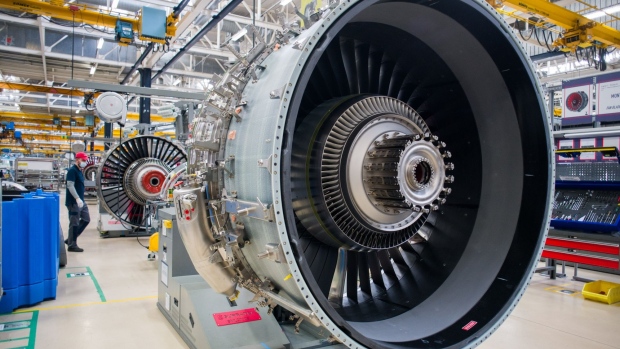Apr 29, 2022
Airbus Engine-Supply Deals Pave Way for Production Ramp-Up
, Bloomberg News

(Bloomberg) -- Airbus SE secured an 18-month extension to key engine-supply contracts as it cranks up narrow-body plane production in a bid to consolidate its lead over Boeing Co. coming out of the coronavirus crisis.
Safran SA of France, which makes turbines for Airbus’s best-selling A320 jets with General Electric Co., and Germany’s MTU Aero Engines AG, a supplier on a rival Pratt & Whitney engine, said Friday they’ve agreed deals through 2024.
The plan “corresponds to what we had committed to before the crisis,” Safran Chief Executive Officer Olivier Andries said on a call with journalists. MTU spokesman Eckhard Zanger said in an email that the company is “getting prepared for production increases.”
The accords point to an easing of tensions between Airbus and key suppliers over the pace of the ramp-up. Safran has previously pushed back against quickly raising A320 build rates as travel recovered from the pandemic, citing supply-chain constraints and a reluctance to invest in case a bounceback proved short-lived.
Airbus is eager to set a roadmap for increased production that will maintain its dominance over Boeing in single-aisle jets even as the 737 Max model racks up orders following a near two-year grounding after two fatal crashes. The A320 backlog runs to several years, so that increased output would both lift revenue and cut waiting times, spurring orders from airlines eager to add planes.
An Airbus spokesman declined to comment. Shares of the European planemaker traded 2.5% higher as of 12:20 p.m. in Paris, while MTU was up 2.3% in Frankfurt. Safran was little changed.
Production Scenarios
In February 2020, when Covid first started to spread globally, Airbus said it was aiming for A320 rates as high as 67 per month by 2023. It was making about 45 a month at the turn of the year after cutbacks during the pandemic, and is moving up from that, targeting 65 a month by mid-2023.
At the same time the Toulouse, France-based firm has pushed suppliers to go as high as 75 per month by the middle of the decade. CEO Guillaume Faury said in January that it aimed to reach a decision on the next production goal by mid-year, with scenarios include holding at 65, pushing a little higher or pursuing a significant jump. Faury confirmed the mid-2023 target on Thursday.
Safran’s Andries, who had suggested that even the 65 planes would be a challenge, said the new deal with Airbus was struck in the past weeks. He declined to specify the volume of LEAP engines that will be delivered in 2024, but added on a call with analysts that it won’t require more capital spending.
Russia Impact
In a quarterly sales report, Safran said the war in Ukraine and sanctions against Russia, as well as inflation and supply-chain bottlenecks made worse by the resurgence of Covid-19 in China, will shave 1.5 percentage points off its profit margin this year. It plans to offset the decline through cost cutting.
Safran continues to buy titanium, used for parts like landing gear, from Russia’s VSMPO-Avisma Corp., which has accounted for about half of its procurement, while searching for alternative sources in the U.S. and Japan.
The loss of the Russia market amounts to about 2% of sales from the Sukhoi Superjet 100 and Irkut MC-21 passenger planes and Kamov Ka-62 and Ka-226 helicopters, as well as services on about 1,000 engines powering A320 and 737 jets. Safran also has 12 leased engines stranded in Russia and will be hurt by the suspension of Soyuz launches through ArianeGroup, in which it has a stake.
©2022 Bloomberg L.P.





